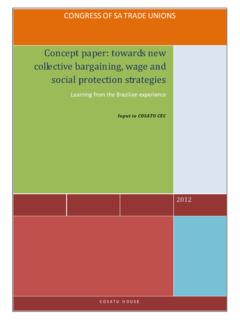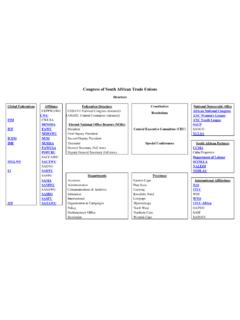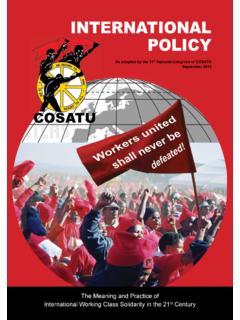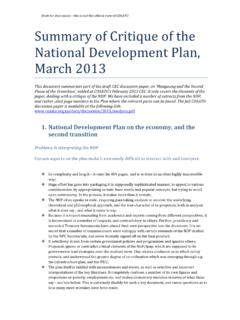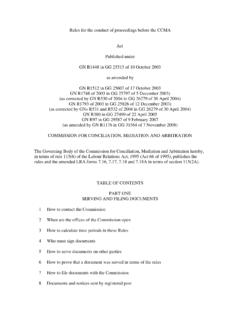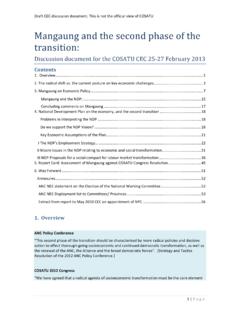Transcription of A National Minimum Wage for South Africa
1 A National Minimum wage for South Africa Neil Coleman COSATU Message from Nick Hanauer billionaire And so I have a message for my fellow filthy rich [..]: If we don t do something to fix the glaring inequities in this economy, the pitchforks are going to come for us. No society can sustain this kind of rising inequality. In fact, there is no example in human history where wealth accumulated like this and the pitchforks didn t eventually come out. You show me a highly unequal society, and I will show you a police state. Or an uprising. There are no counterexamples. None. It s not if, it s when. The model for us rich guys here should be Henry Ford, who realized that all his autoworkers in Michigan weren t only cheap labour to be exploited; they were consumers, too.
2 Ford figured that if he raised their wages, to a then-exorbitant $5 a day, they d be able to afford his Model Ts. What a great idea. My suggestion to you is: Let s do it all over again. We ve got to try something. These idiotic trickle-down policies are destroying my customer base. And yours too. Fin 24, 24 July 2014 The context May 2012- COSATU Executive recognised that post 1994- we have failed to fundamentally transform the apartheid labour structure, particularly its cheap labour basis, and SA continues to experience excessive levels of income inequality & working poverty. Put forward proposals aimed to transform the apartheid wage structure, and introduce a coherent wage solidarity policy. Summary of proposals Drawing on the Brazilian experience, COSATU calls for a National wage , social protection, and economic policy to address inherited inequality & poverty in the labour market.
3 Proposes 4 pillars : of a legislated National Minimum wage (NMW); Collective bargaining (CB) strategies to reconfigure the wage structure, based on comprehensive centralised bargaining ; campaign for universal income support for all adults; package, connected to an overhaul of our macro-economic policies, should lay the basis for a National development strategy Recent developments COSATU s March 2013 bargaining conference adopted these proposals Alliance Summit August 2013- supported in principle the need for a National Minimum wage ; & comprehensive Collective bargaining . Campaigned, with significant degree of success, for inclusion of proposals in 2014 ANC Elections Manifesto. Despite progress, are in early phases of campaign, and SA labour movement facing serious internal challenges International trends Contradictory trends: The need for greater state intervention in wage regulation is accepted , by the ILO and some states, particularly in Latin America, including the need for a National Minimum wage , and a greater state role in promoting Collective bargaining .
4 Others, including IMF & many European states, are trying to radically roll back collective bargaining and wage regulation, as part of a new accumulation strategy. The Brazilian experience NB gains since President Lula (2003-10) in reducing poverty, unemployment & inequality. Key factor - consolidation of National Minimum wage and formalisation of labour market; combined with comprehensive social protection. 2003-10: NMW increased by 81% in real terms. Cascaded up wage structure, in part because many wages in Brazil calculated as multiple of NMW. 17 million formal jobs created 2002-11. Proportion of formal employment in economy (2004-08 ) increased dramatically, outpacing informal jobs by 3:1. Although 90% of new jobs pay less than NMW, this is based on a rapidly rising NMW.
5 The Brazilian experience II Two thirds of reduction in inequality in Brazil is a result of increases in Minimum wages and improvements in wage equity. Remaining gains from social safety net. Contradicts idea that Minimum wage leads to unemployment. Unions bargaining up real purchasing power of wages. No longer bargaining away rights to maintain employment. The Brazilian experience III Increased incomes has fuelled domestic demand, and promoted formal employment. Contribution of domestic demand to Brazilian GDP rose from -0,5% in 2003, to in 2010 (BNDES). President Lula- when we put income in hands of the poor, giant wheels of Brazilian economy started turning . Poverty down by 20 million from million to million, 2003-8.
6 Improved labour inspection has improved compliance. Nevertheless Brazilian labour market still requires major transformation Brazil's Story: A rapidly rising Minimum wage combined with rapidly rising employment- (2013 NMW 678 R$ per month) Increase of regular workers Number of regular workers in Brasil, 2002-2011, milions of workers. Source: Ministry of Labor and Employment (MTE Brazil). 28,7 29,5 31,4 33,2 35,2 37,6 39,4 41,2 44,1 45,6 0 5 10 15 20 25 30 35 40 45 50 2002 2003 2004 2005 2006 2007 2008 2009 2010 2011* Regular workers (Milions) Unemployment Rate, Brazil 12,3 11,5 10,1 10,0 9,4 7,9 8,4 7,0 6,1 0,0 2,0 4,0 6,0 8,0 10,0 12,0 14,0 Ano 2003 2004 2005 2006 2007 2008 2009 2010 What are we calling for in SA? A coherent wage and (pro-poor) incomes policy, aimed at radically reducing inequality A National Minimum wage as one cornerstone and springboard of that policy, to protect all low-paid workers Legislated comprehensive sectoral bargaining to improve on that Minimum wage floor.
7 Failing this, a coherent set of policies to systematically promote centralised bargaining using various state levers- see ANC Manifesto Comprehensive social protection and a universal social wage , to provide workers with non- wage income What are we calling for in SA II? A National wage policy, combined with an appropriate macro economic and industrial Not the policy in National Development Plan which would entrench deregulation of the labour market, repress wages, & promote deindustrialisation This is the lesson of Latin America- for a decent wage policy to be most effective, it must be driven by a developmental state, as part of comprehensive strategy. Eg if raising income in Brazil, wasn t combined with increase in domestic productive capacity, that income would not have driven the creation of large scale formal employment What we are NOT calling for We are not calling for the National Minimum wage to be our destination; but rather to be a vehicle & springboard towards a living wage for all workers, and a restructuring of our economy.
8 It is only a basic floor to protect workers from ultra-low wages. We are not calling for the National Minimum wage to be a substitute for collective bargaining . That would lead to demobilisation of workers, and would lead to the National Minimum wage becoming a maximum wage . Collective bargaining must improve on the National Minimum wage Current challenges in South Africa South Africa has no coherent wage policy Collective bargaining is under attack. The apartheid wage structure is not fundamentally altered: majority of black workers, particularly in the private sector, continue to live in poverty. Minimum wages in sectoral determinations, and many bargaining council agreements are way below the Minimum Living Level (about R4500 to R5000 pm).
9 Huge, & increasing, inequalities between levels of the wage structure: top, middle & between different sectors. The problem of working poverty Well over half of South African workers earn below the estimated Minimum Living Level (around R4500) the working poor. Latest figure: 2013-median wage was R3033 (down from R3115 in 2012)- ie 50% of all workers earned below R3033. And 50% of African workers earned below R2600 in 2013. In 2013 35% of all workers earned below 2/3 of the median- ie earned less than R2020- see graphic below from Stats SA Labour Market Dynamics 2014. The problem of working poverty II Equally worrying, the situation is not improving. The median wage has consistently increased below the level of inflation, and actually decreased 2012-13.
10 Compared to increase of average wages in 2012 by over 8%. This more rapid growth of average wages is because the wages of high income earners massively distort the average figure. Nomura- median wage would have to grow at least by 12% to reduce inequality. M&G 20/6/14 Stats show that there was a real decline in semi-skilled workers wages from 1994-2012. -11% negative growth*. Minimum wages in SA & Sectoral Determinations bargaining Councils (BC s) only cover about 2,4 million workers; and Sectoral Determinations (SD s) million (out of 10,2 million formal sector workers). Some additional company level agreements. No National approach. Fragmentation, and technocratic processes eg in Employment Conditions Commission, which sets statutory MW s, disadvantages workers, and assists powerful interests.
